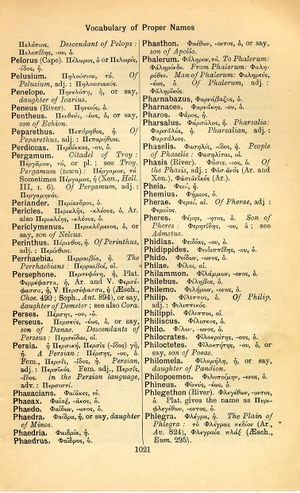Penelope
ὁ δ' εὖ ἔρδων θεοὺς ἐλπίδι κυδροτέρᾳ σαίνει κέαρ → but he who does well to the gods cheers his heart with a more glorious hope
English > Greek (Woodhouse)
Πηνελόπη, ἡ, or say, daughter of Icarius.
Latin > English (Lewis & Short)
Pēnĕlŏpē: ēs, and Pēnĕlŏpa, ae (Pēnĕlŏpēa, = Πηνελόπεια, Auct. Priap. 68, 28), f., = Πηνελόπη,
I daughter of Icarius and Peribœa, wife of Ulysses, and mother of Telemachus, celebrated for her chastity and constancy, Ov. H. 1; Hyg. Fab. 126; Plaut. Stich. 1, 1, 1; Cic. N. D. 3, 22, 56; id. Ac. 2, 29, 65; Hor. C. 3, 10, 11; id. S. 2, 5, 76; Juv. 2, 56: sponsi Penelopae, for sensualists, Hor. Ep. 1, 2, 28.—
B Transf, poet., a chaste wife, Mart. 1, 63, 6.—Hence,
II Pē-nĕlŏpēus, a, um, adj., of or belonging to Penelope, Penelopean: Telemachus, i. e. the son of Penelope, Cat. 61, 231: fides, Ov. Tr. 5, 14, 36.—Subst.: Pēnĕlŏpēa = Penelope, Auct. Priap. 70, 20.
Latin > French (Gaffiot 2016)
Pēnĕlŏpē,¹² ēs, f. (Πηνελόπη), Pénélope [fille d’Icarius, femme d’Ulysse, et mère de Télémaque] : Cic. Ac. 2, 95 ; Hor. O. 3, 10, 11 ; Sen. Ep. 88, 8 || [fig.] épouse vertueuse : Mart. 1, 62, 6.

